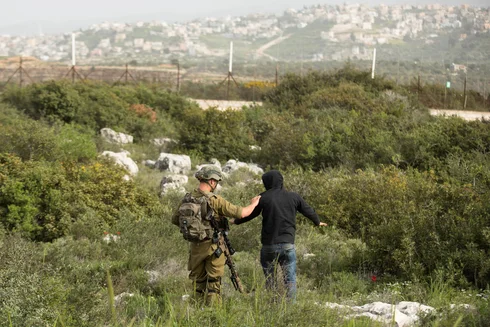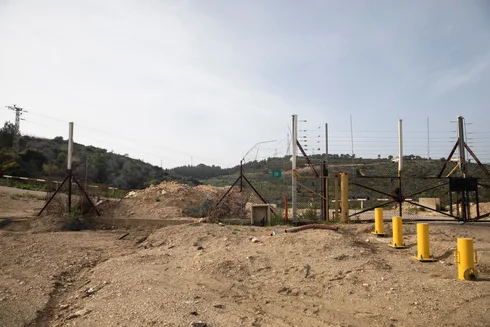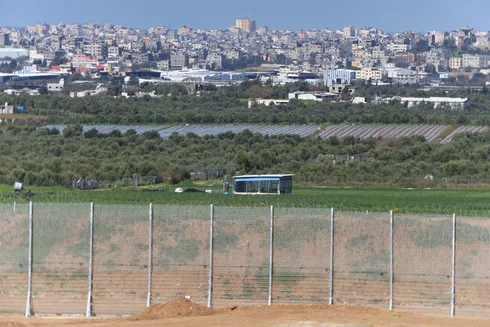Israeli military officials say hermetically sealing up the fence for Palestinians would be a fool’s errand – and that they neutralize security threats much more effectively by other means
The well-known breaches along the security barrier between Israel and the West Bank, and the ease with which Palestinians can enter Israel without permits, have become a familiar recurring subject of debate and rancor following terrorist attacks. But defense officials say the situation is being carefully managed – and that it is not the result of any security failure, as has been widely represented.
Defense officials say the situation involves risk assessments, setting priorities for resources and maintaining a balance between security tensions within the Palestinian Authority.

An IDF soldier questions a suspect near the West Bank town of Ya’bad on Monday.Credit: Amir Levy
“At an early stage, since the building of the barrier, the IDF and Shin Bet [security service] came to realize that it was impossible to control every breach in the barrier or chase every [pemitless] Palestinian. So they decided that if we can’t control the situation, let’s manage it in a controlled manner,” said a security official who until recently participated in decision-making in security forums on illegal entry.
Following last week’s deadly terrorist attack in Bnei Brak, IDF Chief of Staff Lt. Gen. Aviv Kochavi visited the place where the gunman crossed into Israel from the West Bank and said the IDF is bolstering intelligence efforts, reinforcing military units in the West Bank and along the “seam line” between it and Israel, and boosting aid to police.
“We will continue and we will act in every way in order to stop the terrorist attacks. That is our mission.” But Kochavi did not mention upgrading the barrier or preventing illegal entry.
Security officials told Haaretz that it is no accident that the political and security leadership is not committing to hermetically sealing the movement of people entering Israel illegally from the West Bank. While public-facing statements from senior security and political leaders following attacks say the breaches must be sealed, behind the scenes and in meetings defense officials believe it would be a mistake to consequently prevent the entry of some 50,000 workers into Israel. They consider the situation to be under control.
“This fence, even when it was first being built, was not meant to prevent the movement of terrorists who were planning on carrying out an attack in Israel. Whoever wants to leave will succeed,” said a defense official involved in decision-making on how forces along the separation barrier operate.
“We thwart terrorists through intelligence from the Shin Bet, with the hope that their arrest will come even before they reach the fence,” he said.
Managing the breaches
Defense officials said the main goal of constructing the separation barrier was to make it possible to control the area after the Second Intifada terror attacks; to stop the theft of cars; and to make it difficult for the many workers without permits to freely leave from the point closest to their homes.

A breach in the separation barrier in the northern part of the West Bank on Tuesday.Credit: Amir Levy
“We realized very quickly that it wasn’t possible to make the fence impenetrable. A large part of the fence is quite basic in construction and can be cut with simple pliers.”
Until a few years ago, defense officials would diligently chase after every breach, but with a barrier that is over 500 kilometers (310 miles) long, the IDF found itself dealing with a problem that diverted its resources, troops and attention from more important missions, said the official.
“Every time we closed a breach in the fence, the next day there was a breach 100 or 200 meters away. The more cuts there were, the weaker and more ineffective the fence became,” said the defense official.
This early realization led the defense establishment to decide that, since the existing infrastructure and budget made it impossible to completely control illegal entry from the West Bank into Israel, it would be better to ensure security forces could manage the problem, even if only partially. This is all with the understanding that tens of thousands of illegal workers would enter Israel daily without work permits, added the official.

Israel-Gaza border fence in March. Credit: Ilan Assayag
The official said this means assuming control at the points where there are breaches, as well as “to know, even if it’s not precise, how many illegal workers pass through, where, and how many came back.” He added that it also means “you are leaving agricultural gates open. There are almost no fences around them and it is possible to leave easily.”
But, he added, “At the same time, you decide which breaches you are able and willing to contain.”
The official said this is not an official position that will be stated in public – only in private meetings in which officials are required to present their positions on the issue.
“The army and the Shin Bet know where the problematic areas are where they will not allow Palestinians to cross,” the official said. “Last year, it was decided to prevent passage in the Bat Hefer region, where people entered illegally with criminal intent – breaking into houses, stealing cars, harassing women in nearby communities.”
“The fear was that a criminal incident would become nationalistic. So they reinforced troop presence there,” he said.
Contrary to the view that the breaches are not under control and that any Palestinian who wants to cross into Israel simply cuts the fence somewhere near their home, defense officials argue that on the other side of the barrier things are much more organized than the Israeli public is aware of.
“Every day, tens of thousands of Palestinians go to work through these holes without permits,” an official said. “There are hundreds of kilometers of separation barrier. The breaches are not everywhere and still those tens of thousands of workers know how to reach the passageway they need. They arrive in organized rides from inside the West Bank, and waiting on the other side are taxis, buses and private drivers who pick them up.”
“Even when the breach is closed, the next day everyone knows how to get to a new point has been opened,” he said. “I can’t say if this is coordinated by a particular person, but it is much more orderly and organized than what is commonly thought.”
The commander of the district brigade is ultimately responsible for preventing Palestinians without permits from entering Israel.
“There is a directive from the Central Command to prevent workers without permits from entering Israel,” said a defense official. “Each brigade commander interprets this request differently. One may decide that the operations along the fence will leach large forces away from areas with higher security tensions. Another may decide that preventing the entry of Palestinians from an area under his command would lead to confrontations with IDF forces.”
Gaza and the North first
“Strengthening the fence in a way that doesn’t allow anyone to cross it means manpower that the IDF doesn’t have – and the IDF is busy with much more significant threats,” said a senior security official. “Replacing this fence, manning it with soldiers and technology – this demands a budget of hundreds of millions, if not more. When we assess where best to put each shekel, construction of the barriers in Gaza and on the northern border are far more urgent.”
For defense officials, this isn’t just a matter of money or operational priorities. Behind closed doors, they say that preventing these 50,000 Palestinians a day from working in Israel could create even worse security problems in the long run.
“Palestinians in the West Bank are fed up with terror,” one said. “What interests a Palestinian from Ramallah, Jenin, Qalqilyah or Tul Karm today is earning a living … Religious, nationalist issues no longer manage to bring the masses into the streets, and certainly not confrontations and armed struggle against the IDF.”
“If a third intifada develops, it will be due to economic distress, a situation where they don’t have food in the refrigerator for their children and don’t have anything to get up for in the morning,” he added.
Palestinians working in Israel illegally earn 1.5 billion shekels ($470 million) a year, defense officials say, and this money has a major impact on the entire Palestinian economy. If this money were taken away, a senior official who has contact with Palestinian officials said, the Palestinian Authority could collapse economically, and all the Palestinians who used to work in Israel “would be in the streets with no hope.”
“Since 2018, the Palestinian public has taken to the streets to protest mainly over issues of funding, salaries, the cost of living,” he added. “That’s also what preoccupies Hamas in Gaza nowadays.”
As a result of the Bnei Brak attack, permitless workers were barred from Israel on the eve of Ramadan, which badly hurt both the workers and the merchants they would otherwise have patronized, he said. “When I speak with merchants and PA officials, they tell me very clearly that this attack hurt them. Very few people will support this attack openly.”



Leave a Reply
You must be logged in to post a comment.